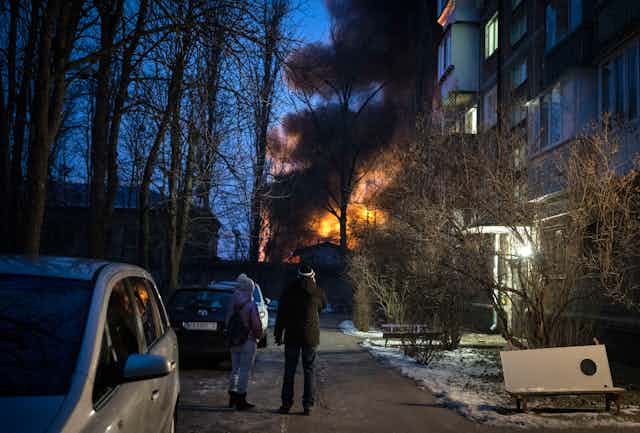Russian officials, as well as many outside observers, believed that Russia’s invasion of Ukraine on Feb. 24, 2022, would be a rapid affair. The war, however, has defied these expectations.
As we approach the one-year anniversary of the conflict, Russia instead finds itself stuck in a protracted conflict with no easy exit. Russia, in order to achieve the off-ramp it desperately seeks, is now more than ever focusing on targeting the Ukrainian home front.
Russia’s changing strategy for the conflict is the result of the weakness of its conventional forces. The Russian army, in short, possessed severe structural problems that limited its offensive capabilities.
Furthermore, Russia’s efforts to win the war in a rapid manner while minimizing strain on its people meant that units designed to be supported by large numbers of conscripts instead went directly to the front. The result was that these units suffered overwhelming casualties in the initial phases of the conflict.
Russian losses
The loss of these soldiers for Russia, with estimates of more than 100,000 dead, injured or deserted, has proven devastating for the army.
Russia’s efforts to replace these soldiers have become increasingly desperate. Even the Wagner Group, a highly trained mercenary unit that was unofficially part of the Russian army, has resorted to recruiting criminals in an effort to replace their depleted manpower.
The Russian state even went so far as to enact a partial mobilization of reservists in September 2022. This proved highly damaging for Russian morale, with men fleeing the country to avoid conscription.
Read more: Russians flee the draft as the reality of the war in Ukraine hits home
This decline occurred despite indications that Russian authorities focused their mobilization efforts on the Russian Federation’s minorities in order to minimize the impact on ethnic Russians. While the effort was initially devastating for Russian morale, it did stabilize the front lines of the conflict.

Ukraine has the advantage of morale
Stabilization, however, is not enough for Russia. The longer the war continues, the more damaging it is for both the Russian state and its leadership.
There are also indications that the Russian army is severely lacking equipment. It needs the war to end sooner rather than later.
In order to win, or at least declare victory, it needs to undermine Ukraine’s greatest strength: the morale and spirit of the Ukrainian people.
Ukrainian morale has been the country’s greatest asset in the conflict. Despite the devastating effects of modern war, morale in Ukraine remains high. It directly transfers to the battlefield, and has been a strength of the Ukrainian army since the war’s outset.
Russia’s deplorable actions in occupied Ukraine, furthermore, have stoked Ukrainian sentiment against Russia.
With Russia’s military unable to meet the government’s political objective of a quick end to the war, Russia has redoubled its efforts to weaponize the Ukrainian population. This is not a new development. Russia had sought to weaponize Ukrainian refugees at the outset of the conflict.
Read more: Russia's invasion of Ukraine fuels a refugee crisis that could help Putin win the war
Targeting civilians
Now, with winter conditions and inadequate supplies preventing the Russian army from fully continuing conventional operations, it is directly targeting Ukraine’s civilian population.
The target of Russian attacks, as a result, is public infrastructure, especially electricity, with the aim of causing demoralizing hardship for Ukrainian civilians.
Direct attacks against civilians contravene the Fourth Geneva Convention and its subsequent amendments. These amendments, however, contain a significant flaw. Attacks that cause harm to civilians are allowed so long as it is not disproportionate to the “direct military advantage anticipated.”
This loophole in the Geneva Conventions is what Russia now exploits in Ukraine. Russia in the fall started systemic bombing efforts to target Ukraine’s power grid and infrastructure in an effort to break Ukrainian morale. While such a campaign would normally be cost-prohibitive, especially given Russia’s declining missile stocks, it is employing a 21st-century weapon: drones.
Drones are both cheap and hard to defend against when employed en masse, at least in a manner that’s not cost-prohibitive. With probable aid from Iran, Russia has flooded the country with this cheap, and deadly, weapon.

Electricity disruptions
With electricity in Ukraine constantly disrupted by Russian attacks, the Ukrainian population faces a difficult choice — to remain in the country under such conditions or flee abroad.
This choice, and the helplessness it instils, is Russia’s plan. The Ukrainian government has already been forced to ask refugees from the conflict to remain abroad due to the limited electricity.
Ukrainian determination, if anything, has become more resolute in the face of such tasks.
Morale, however, is a concept as fragile as it is strong. Concerted efforts must be made, both in Ukraine and abroad, to keep it high in the face of such attacks.

